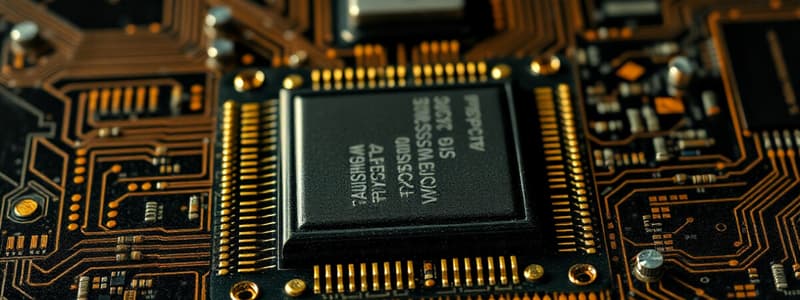Podcast
Questions and Answers
What is the main purpose of the malloc function in C?
What is the main purpose of the malloc function in C?
- To allocate a specified number of bytes in the heap (correct)
- To free previously allocated memory
- To automatically manage memory allocation
- To define the size of arrays at compile time
Which statement about memory management in C is true?
Which statement about memory management in C is true?
- malloc returns a pointer that must always be of type int.
- Heap memory must be freed after use to avoid memory leaks. (correct)
- Arrays in C can dynamically change their size during execution.
- The stack can allocate an unlimited amount of memory.
How can we allocate memory for 10,000 integers using malloc?
How can we allocate memory for 10,000 integers using malloc?
- malloc(sizeof(int) * 1000);
- malloc(10000 * sizeof(int)); (correct)
- malloc(10 * sizeof(int));
- malloc(10000);
What type of pointer does malloc return?
What type of pointer does malloc return?
What is the result of not freeing heap memory after its use?
What is the result of not freeing heap memory after its use?
What notation is used to access values in a C array?
What notation is used to access values in a C array?
Why do we not need the address-of operator when using scanf for strings in C?
Why do we not need the address-of operator when using scanf for strings in C?
Which statement about arrays in C is true?
Which statement about arrays in C is true?
What is the primary function of the Arithmetic Logic Unit (ALU) within the CPU?
What is the primary function of the Arithmetic Logic Unit (ALU) within the CPU?
What is true about the way arrays are passed to functions?
What is true about the way arrays are passed to functions?
Which of the following statements is correct regarding pointers?
Which of the following statements is correct regarding pointers?
What key piece of information is often necessary to pass along with an array to a function?
What key piece of information is often necessary to pass along with an array to a function?
In which way should a pointer variable be declared?
In which way should a pointer variable be declared?
Which is a correct behavior of memory allocation in programming?
Which is a correct behavior of memory allocation in programming?
When declaring multiple pointers in one line, what must be ensured?
When declaring multiple pointers in one line, what must be ensured?
How are control signals utilized within the CPU?
How are control signals utilized within the CPU?
Flashcards are hidden until you start studying
Study Notes
CPU Components
- The Arithmetic Logic Unit (ALU) performs calculations
- The control unit manages the execution of instructions
- Registers are high-speed memory used by the CPU during calculations
- Memory stores program data and instructions
Passing Arrays to Functions
- Arrays are passed by reference, meaning functions can modify the array's contents
- When passing arrays, it's often necessary to also pass the array's length for correct function operation
String Methods
- Strings in C are stored as arrays of characters
- There are built-in functions for manipulating strings, such as strlen, strcpy, and strcmp
Pointers
- A pointer variable stores the memory address of another variable
- Pointers are declared using the asterisk (*)
- Pointers must be assigned the correct data type
- To assign the address of a variable to a pointer, use the address-of operator (&)
Memory Allocation
- Memory is automatically managed by the compiler on the stack
- The heap allows manual allocation of memory using malloc
- Malloc takes the number of bytes to allocate as an argument
- Once memory is no longer needed, it should be freed using the free function to avoid memory leaks
Arrays are Pointers
- In C, arrays are essentially pointers to blocks of memory
- Array notation (using square brackets) and pointer offset notation are equivalent ways to access elements
- Strings in C are arrays, which explains why scanf doesn't need the address-of operator for string input
Studying That Suits You
Use AI to generate personalized quizzes and flashcards to suit your learning preferences.




